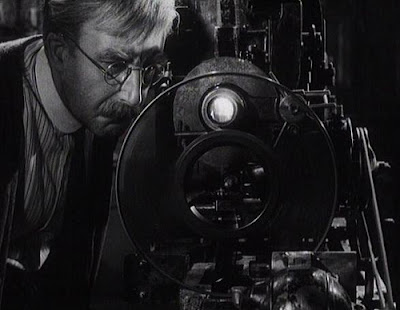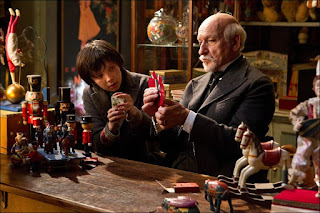At
Open the Pod Bay Doors, HAL, I make a practice of not "reviewing" major studio movies currently in wide theatrical release, and I'm not about to start now. After all, the internet is so replete with film reviews and commentary that aggregation sites such as
Rotten Tomatoes and
Metacritic will probably soon achieve their own Borg-like hive-mind sentience and enslave us all to rewrite our lives as three-act rom-com screenplays. No doubt you've already selected the professional, amateur, or webby pro-am hybrid critics/reviewers/pundits who speak to your personal cinematic sensibilities (
I sure have). And
— bottom line
— no one's currently paying me to do so.
But I will say this much:
Great Chaplin's ghost! Hugo sure in a damn fine movie.
It's the mighty Scorsese's charming,
gorgeous, beating-hearts-on-sleeves love letter to "the magic of the movies" and the
fun of storytelling (in all forms), and especially to the vintage cinema he has championed throughout his career. Regular readers here already know that Scorsese's and
Hugo's unconcealed treasuring of silent-era greats such as
Keaton,
Chaplin,
Lloyd,
Fairbanks, and especially the pioneer at the center of the film's story,
Georges Méliès, speaks right to my cinephilic lub-dubber.
Is this the Martin Scorsese we know from
Mean Streets,
Taxi Driver,
Raging Bull,
Goodfellas,
The Departed, and
Shutter Island? Arguably, no, although the sheer experienced filmcraft on display throughout
Hugo is never short of masterly.
Instead, the Scorsese we get this time is the zealous collector and encyclopedic fanboy-turned-pro who for years I've found giving passionate cineaste testimonials on DVDs such as
Charlie: The Life and Art of Charles Chaplin,
The Life and Death of Colonel Blimp,
The Red Shoes,
Black Narcissus,
The Public Enemy (wherein he appraises Cagney's performance as where "modern screen acting begins"), Jean Renoir's
The Golden Coach and
The River (
Hugo's Monsieur Frick, as played by Richard Griffiths, looks
a lot like Renoir, the scenes with the steam train engineer and his fireman quote outright Renoir's 1938 film
La bête humaine, and Renoir's name appears in the closing credits list of Acknowledgements), and a dozen or more other films. And that's not including the full-length commentaries to his own movies.
Throughout Hugo, we see the love light in Scorsese's eyes, and it's flickering at 24 frames per second.
Here's an "easter egg" I'm looking forward to when I get the movie on Blu-ray — name-checking all the period movie posters that festoon several of Hugo's scenes. I caught Fantômas and Judex (two pulp hero adventure serials directed by Louis Feuillade), Charley Chase's Why Men Work (as "Pourquoi les hommes travaillent"), a poster of Chaplin without a film title (rights issues?), a colorful illustration of Chaplin forebear Max Linder, and others panning by too quickly to capture in my memory.
Even Méliès had his predecessors in the
Lumière brothers, and they receive a significant nod as Méliès recounts how he got started in filmmaking during a carnival screening of their "Arrival of a Train at La Ciotat Station." Later, in a montage sequence, we glimpse just enough of several later films to identify them, such as the
The Great Train Robbery, The Cabinet of Dr. Caligari, Intolerance, The Thief of Bagdad, Tumbleweeds (William S. Hart's last movie), Keaton's The General, Chaplin's The Kid, and Louise Brooks in Pandora's Box.
I'd love the eventual disc to add a track that annotates
Hugo's
filmic homages, for they are abundant and pointing them out would create added value illumination. (Hey, if anybody on the production end wants a hand with that, just contact me here, 'kay?)
Plus,
Hugo speaks between the frames about the creative process, both explicitly in the film's narrative and implicitly in the way it was made. I can't shake the notion that we're glimpsing Scorsese celebrating the tortuous, thrilling, clockpunky act of movie-making itself, like Chaplin using
The Circus as a vehicle to comment about the often precarious art and craft of being funny.
The film aims itself right at my limbic system even in its incidentals. For instance, the whole thing is set in my own mind's-eye image of romanticized Paris at the turn of the 20th, with Django Reinhardt playing his gypsy jazz in a café where James Joyce shares a table with Salvador Dalí. We get those mammoth steam locomotives barreling through Paris' Gare Montparnasse station, so evocative since I was a kid. And suffusing the setting and storytelling — all that brass clockwork, gears within gears; visit my house and you'll see that I have a thing for old clocks.
Hugo is being marketed as a "kids film," and I guess technically it is that. Its screenplay is conventionally structured enough to attract parents looking for nonthreatening mainstream "holiday family film" fare. Sacha Baron Cohen's Inspector Gustav comes within his mustache's width of tipping over into Disney cartoon villain mode before being given some redeeming dimension when it counts.
But it's not
only a "kids film." There's plenty on tap for those of us in the higher age brackets, especially those of us whose love of movies encompasses far more than the latest 'splodey summer blockbusters.
And yet I'm so glad it
is a "kids film."
For one thing, here's a movie in which the plot, and therefore our two child leads, drives forward with an appreciation not only of movies — but also of books: of reading, of discovering the world and engaging your authentic self via leather-bound covers and the Narnia-like expanses of bookshops and libraries.

Precocious Isabelle (Chloë Moretz) finds joy in trying out new words as she leads Hugo (Asa Butterfield) from his clockwork warren within the Paris train station walls through the looking-glass/wardrobe/pirate ship/TARDIS that is Christopher Lee's (!) bookshop, a storefront cathedral so piled high with shelves and stacked-up volumes that he might be living in an Escher drawing. To Isabelle the shop is "Neverland and Oz and Treasure Island all wrapped into one." The fact that she can also recite Christina Rossetti gets them out of a sticky predicament with Inspector Gustav early on. Give her another 15, 20 years and there's my dream girl. (In fact, she's Elizabeth, so big win there.)
As the plot's gears start turning faster, Hugo repays her in kind by leading her into a story of their own beyond the written page. "This might be an adventure," she observes, "and I've never had one before, outside of books at least."
While I'd say that Lee's bibliophile shopkeeper could have used a moment or two of his own for some development, he earns his keep in the film by giving Hugo the talisman he needs right when he needs it most: an edition of
Robin Hood that, the man says, is innately meant to be Hugo's. It's a moment that sets in motion Hugo's act of reigniting the storyteller's spark within morose old Méliès.
When they discover the missing clues they need to solve the mystery of the heartbreak embittering Isabelle's "Papa Georges," it happens within a library. There, the adult guide they encounter to get them into Act III isn't a wizard or a talking lion or a pirate. He's a movie buff and, most crucially, an author.
And the "reading is fundamental" angle is not conveyed with a heavy hand. It's naturally integral to the narrative and not slathered on like a dose of "good for you" broccoli on a dish of ice cream.
During the showing, I observed the kids packing our audience — ages 6-13, I'd say. I was pleased to see them so engrossed and entertained. They squealed as if opening birthday presents during the recreations of the authentic "old timey" Méliès films. I was happily surprised when they fully engaged with the scene where the two leads sneak into a showing of Harold Lloyd's famous Safety Last, the kids in our audience responding to Lloyd dangling from the clockface as much as Hugo and Isabelle did. They laughed at a quick gag from Keaton's The General. (What they'd think of Louise Brooks
and the entirety of Pandora's Box should probably be run by their parents first.)
And when it was all over, they applauded.
So now I'm wondering: Given
Hugo's critical and commercial success, and given its likely "long tail" staying power as a Scorsese film, is it possible that we'll now see a generation of kids grow up with more familiarity of silent-era cinema, from
Méliès forward, and with a fuller understanding
of where the movies they enjoy
come from —
than any generation since ... well, since ever, even their great- or great-great grandparents who were those first movie audiences?
I'm going to click Publish Post hoping so.
Thanks, Mr. S.
Music: Django Reinhardt
Near at hand: Gifts from London for Judy and Dan
 It's that listy time of year. Naughty vs. nice, art vs. commerce, Tree of Life vs. Twilight, etc. Movie critics, film pundits, and cine-bloggers are compiling their summations of what happened, or didn't, onscreen in 2011.
It's that listy time of year. Naughty vs. nice, art vs. commerce, Tree of Life vs. Twilight, etc. Movie critics, film pundits, and cine-bloggers are compiling their summations of what happened, or didn't, onscreen in 2011.  IndieWire: Indiewire's Greatest Hits: The Top 10 Reviews From 2011
IndieWire: Indiewire's Greatest Hits: The Top 10 Reviews From 2011














































